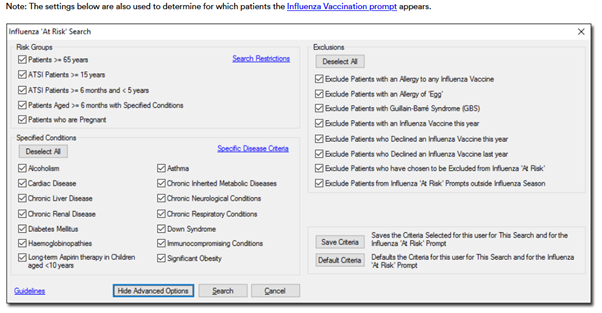Neither MedicalDirector nor Best Practice generates automated prompts to immunise all children against influenza. But here’s a quick fix.
Children may now be the most frequent victims of influenza, which can cause serious illness and which is currently filling our children’s hospitals.
Some of the hospitalised children have predisposing comorbidities, but many do not, including some of those admitted to intensive care units and some who have died from complications. We are seeing daily reports of this in the news, with health authorities urging parents and carers of children to have them vaccinated now against influenza.
National guidelines have advised since 2013 that everybody over six months old should receive influenza vaccine. In 2019 the vaccine was funded by six state and territory governments for all children aged six months to five years. In 2020 it was added to the National Immunisation Program schedule for that age group. Influenza vaccination will be included in new printings of the state-based baby books, which will reinforce its importance to parents and carers.
Yet despite all current strategies, rates of influenza vaccination of children remain low:

Most clinical software packages automatically prompt users about a range of preventive and other care that is or that is likely to be indicated for the patient, based on their recorded health history, and which has not been performed within the recommended time frame. The prompts cover a range of vaccinations, including influenza for older adults. The preventive care prompts currently available in clinical software are likely to have improved the quality of care that GPs provide.
It was a surprise to learn that neither of the two most widely used clinical software packages generates automated prompts to vaccinate all children against influenza.
MedicalDirector allows users to choose to have onscreen prompts to GPs and practice nurses generated for influenza vaccination for some children. The three categories of children that can be included are those who might be at highest risk. These children constitute only a small minority of all children. No influenza vaccination prompts are available for the majority of children.

The Best Practice clinical software package does not generate any prompts for influenza vaccine for children. No information is available from Best Practice about for which types of patients its influenza vaccination prompts are generated.
If accreditation of clinical software as fit for purpose is ever introduced, all software packages that lack this basic prompt might fail to be accredited.
I have asked MedicalDirector and Best Practice to improve their automated prompts to include influenza vaccination in everybody over six months old. It should be a user-selectable option.
In the meantime, how can we address this deficiency in GPs’ clinical software packages?
We know that personal advice from one’s GP has the greatest influence on uptake of preventive care. As a part-time researcher in general practice at the University of Adelaide, I have worked with our GP colleague Dr Anton Knieriemen, the author of the Doctors Control Panel software, to create a function in that system that automatically sends personalised targeted text messages to patients about care that is recommended for them based on their recorded clinical history and that is due to be provided.
The messages advise the patient to ask about this at their imminent appointment. Currently the messages are sent shortly before booked appointments, which we have found to have the best effect. We have used these reminders successfully in research trials to increase vaccination against invasive pneumococcal disease and against influenza in adults whose chronic condition(s) put(s) them at higher risk.
Dr Knieriemen and I have created an automated SMS to be sent before consultations to parents or carers of children over six months old whose clinical record does not include the current influenza vaccination. Some of my GP colleagues and I are currently piloting this strategy with our patients.
A combination of four features makes this reminder system unique:
- it is fully automated;
- the reminders are sent only to patients who have already made an appointment;
- the messages are sent to the patient rather than being presented only to the GP or practice nurse; and,
- the reminders are sent when the patient can act on the advice immediately and receive the recommended care with a minimum of additional time, effort or cost.
This opportunistic approach has limitations in rapidly improving influenza vaccination of all children, because most children who are usually healthy attend relatively infrequently. To address this limitation, we can complement the opportunistic SMS messages by using clinical audit software to generate a list of children who have not yet received this year’s influenza vaccine, and send a message to the parents or carers of those children advising them to make an appointment for the child to receive the vaccine. This process requires human intervention to create the clinical audit and initiate the sending of the reminders, and it has to be repeated at least annually.
My experience is that asking patients to make appointments for some specific purpose has a low yield of them actually doing so. In addition, some of these “recall” messages are wasted because the patient no longer needs the care, has moved to another practice or has died.
The most effective approach might be:
- when the current year’s influenza vaccine becomes available conduct a clinical audit to create a list of children who are current patients;
- use that list to send an SMS message to their parents or carers advising them to make an appointment for their child to be vaccinated; and,
- reinforce that message by automated opportunistic SMS messages before subsequent consultations during the rest of the year, until the child has received the vaccine, or the child’s ineligibility or the parents’ or carers’ refusal has been recorded.
The function in the Doctors Control Panel software to generate SMS messages to parents or carers of children unvaccinated against influenza is available now to all current and new users of the Doctors Control Panel software.
Dr Oliver Frank is a GP at Oakden Medical Centre in Adelaide, and a senior research fellow in the Discipline of General Practice at the University of Adelaide.




